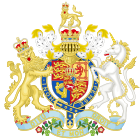Grampound (UK Parliament constituency) facts for kids
Quick facts for kids {{{Name}}}[[{{{Type}}} constituency]] |
|
|---|---|
| [[Image:{{{Map1}}}Constituency.svg|120px|]] [[Image:England{{{Map2}}}.svg|120px|]] |
|
| {{{Name}}} shown within [[{{{Entity}}}]], and {{{Entity}}} shown within England | |
| Created: | {{{Year}}} |
| MP: | {{{MP}}} |
| Party: | {{{Party}}} |
| Type: | House of Commons |
| County: | [[{{{County}}}]] |
| EP constituency: | [[{{{EP}}} (European Parliament constituency)|{{{EP}}}]] |
Grampound was a small town in Cornwall, England. For many years, it had the power to send two people to represent it in the House of Commons. This is the main part of the UK Parliament where laws are made. Grampound was a "borough constituency," meaning it was a town that could elect its own Members of Parliament (MPs). It sent MPs from 1547 until 1821.
Contents
Grampound's History in Parliament
Grampound was given the right to elect MPs by King Edward VI in 1547. This meant it became a "borough." The town had a Mayor, Aldermen, and a Town Clerk to help run things.
Grampound was one of many "rotten boroughs" in Cornwall. These were small towns that had very few voters but still got to send two MPs to Parliament. This gave them a lot of power for their size.
Where Was Grampound's Voting Area?
The area that Grampound's MPs represented was just the town itself. Grampound was a market town about 8 miles (13 km) from Truro, located on the River Fal.
Who Could Vote in Grampound?
In Grampound, only certain people could vote. These included the Mayor, the Recorder (a legal officer), the Aldermen, and special "Freemen" chosen by the town council. In 1816, there were only about 42 voters in the whole town. Even though there were 80 houses, not everyone could vote.
Many powerful people, like the Earls of Mount Edgcumbe and Sir Christopher Hawkins, tried to control who became an MP for Grampound. However, the voters in Grampound were often more interested in getting money for their votes. People even bragged about getting large sums of money for voting a certain way. Voters also received payments throughout the year, sometimes for things like sickness or funerals. This system was like a "general free insurance" for them. Grampound became very famous for this kind of unfair voting, and it was known as a place where elections were not honest.
Grampound Loses Its Voting Rights
| Act of Parliament | |

|
|
| Long title | An act to indemnify Persons who shall give Evidence before the Lords Spiritual and Temporal on the Bill to exclude the Borough of Grampound, in the County of Cornwall, from sending Burgesses to serve in Parliament; and to enable the Borough of Leeds, in the County of York, to send Two Burgesses to serve in Parliament in lieu thereof. |
|---|---|
| Citation | 1 & 2 Geo. 4. c. 21 |
| Dates | |
| Royal assent | 6 April 1821 |
| Act of Parliament | |

|
|
| Long title | An act to exclude the Borough of Grampound, in the County of Cornwall, from sending Burgesses to serve in Parliament; and to enable the County of York to send Two additional Knights to serve in Parliament, in lieu thereof. |
|---|---|
| Citation | 1 & 2 Geo. 4. c. 47 |
| Dates | |
| Royal assent | 8 June 1821 |
After the 1818 election, there were many complaints that people had been paid to vote. Because of this, Lord John Russell suggested that Grampound should lose its right to send MPs to Parliament. This is called "disfranchisement." He wanted to give Grampound's two MP seats to a new, larger town called Leeds.
Usually, when a town had a lot of unfair voting, the solution was to make its voting area bigger. This would include more people who were not involved in the corruption. However, this wasn't possible for Grampound. The towns nearby were also "boroughs" with their own voting problems. Making the area bigger would just mean more people to pay off.
After some delays, Lord Russell introduced a bill in 1821. Many people didn't like the idea of giving the seats to Leeds because it would mean many working-class people could vote. Eventually, the House of Lords changed the bill. They decided to give the two MP seats to the county of Yorkshire instead. This bill became law, and Grampound lost its right to send MPs in 1821.
Elections in Grampound
Most elections in Grampound were not closely fought. This means that the MPs were often chosen without much competition. This was common in many old "boroughs" before big changes were made to Parliament.
However, there were a few times when elections were contested:
- In 1741, two candidates, Daniel Boone and William Banks, challenged the current MPs. They managed to get their own Mayor elected to help them win. They won the election, but the losing candidates decided not to challenge the result.
- In 1754, some voters tried to get more money for their votes by suggesting new candidates. However, the government-backed candidates, Merrick Burrell and Simon Fanshawe, won the election.
- In 1808, there was a very complicated election. Two different groups of voters claimed to have elected their own MPs. In the end, Robert Williams and John Teed were declared the winners after a special review.
- In 1814, one of Grampound's MPs, Andrew Cochrane-Johnstone, was removed from Parliament for being involved in a stock fraud (a type of financial cheating). A new election was held, and Ebenezer John Collett won.
See also
- List of former United Kingdom Parliament constituencies
 | Bessie Coleman |
 | Spann Watson |
 | Jill E. Brown |
 | Sherman W. White |

